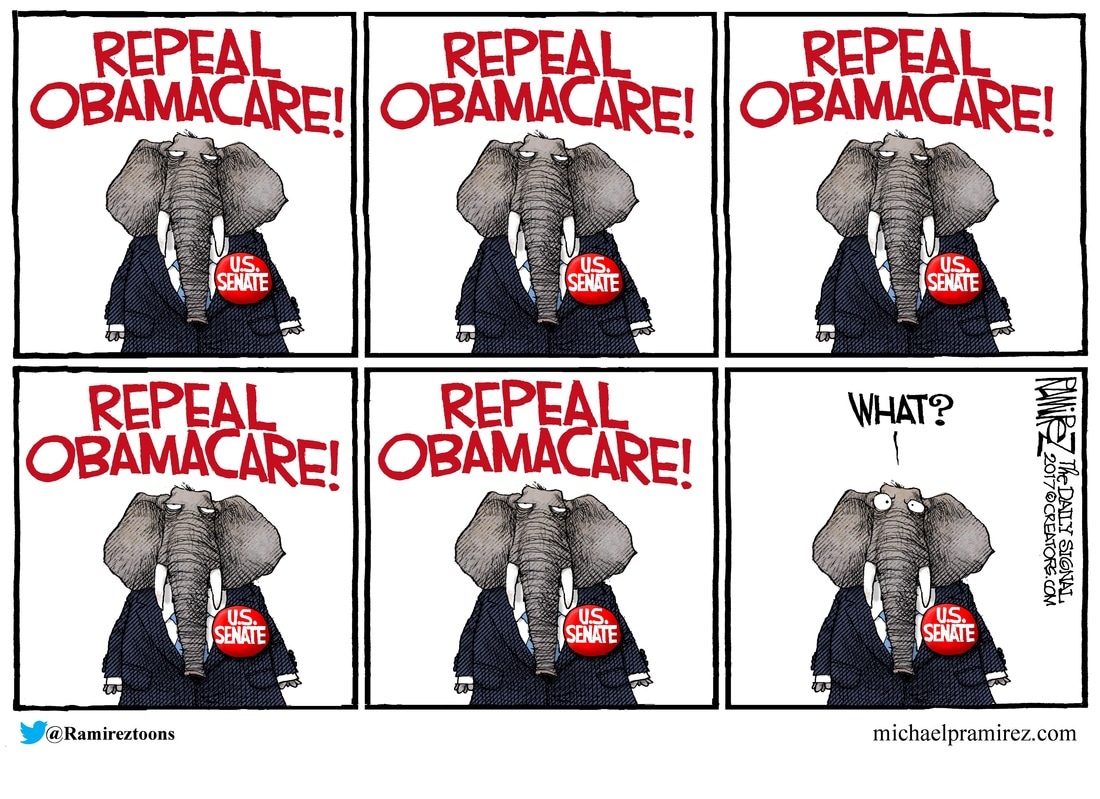Welcome to the World of Pulitzer Prize Winning Political Cartoonist Michael P. Ramirez
Repeal 06-24-17 |
|
The Senate Health Care Bill Misses a Key Opportunity. Here’s What Should Be Done.
Edmund Haislmaier / Robert Moffit / Marie Fishpaw / June 22, 2017 THE DAILY SIGNAL
While the ongoing congressional effort to reform health care is falling short of repealing Obamacare, it is critical that Congress maximize every opportunity to undo Obamacare’s damage.
The draft bill released on Thursday by the Senate misses important opportunities to move closer toward that objective.
On net, the Senate bill is better than Obamacare because it contains provisions to reduce insurance premiums and promote access to insurance in the short run, cut taxes, and provide major Medicaid reform that will help refocus the program on those most in need.
It is still an open question, however, whether the bill will repair enough of the damage caused by Obamacare so that the middle-class self-employed will be able to find affordable health insurance in five years.
To move closer to the goal of undoing Obamacare’s damage, the Senate should go further by expanding states’ options to encourage continuous coverage and by providing additional Medicaid reforms.
Stabilizing Insurance Markets by Freeing States From Obamacare’s Federal Mandates
Like the House bill, the Senate bill repeals Obamacare’s individual mandate and employer mandate. It also repeals the limitation on age rating of premiums. These changes allow states to set age-rating parameters that more closely align insurance premiums with age-related differences in average medical expenses.
The Senate bill also allows states to apply for waivers from other Obamacare insurance mandates, including the requirements that plans cover specified “essential health benefits” and provide minimum actuarial value.
Rather than creating a new waiver process (as the House bill would), the Senate bill simplifies and streamlines a waiver process in current law (referred to as Section 1332). That approach allows states to waive additional insurance market provisions such as the standards for qualified health plans.
As such, the Senate waiver approach has somewhat broader scope than the version included in the House bill.
However, a major weakness of the Senate bill is that, unlike the House bill, it does not create enough incentives for continuous coverage—either directly or by permitting states to use the waiver process to adopt such provisions on their own. Such provisions are important to limiting the adverse selection and gaming effects that have driven up premiums under Obamacare.
The Senate bill should be strengthened by at least expanding the waiver process to permit states to experiment with different approaches for incentivizing continuous coverage. read more
Edmund Haislmaier / Robert Moffit / Marie Fishpaw / June 22, 2017 THE DAILY SIGNAL
While the ongoing congressional effort to reform health care is falling short of repealing Obamacare, it is critical that Congress maximize every opportunity to undo Obamacare’s damage.
The draft bill released on Thursday by the Senate misses important opportunities to move closer toward that objective.
On net, the Senate bill is better than Obamacare because it contains provisions to reduce insurance premiums and promote access to insurance in the short run, cut taxes, and provide major Medicaid reform that will help refocus the program on those most in need.
It is still an open question, however, whether the bill will repair enough of the damage caused by Obamacare so that the middle-class self-employed will be able to find affordable health insurance in five years.
To move closer to the goal of undoing Obamacare’s damage, the Senate should go further by expanding states’ options to encourage continuous coverage and by providing additional Medicaid reforms.
Stabilizing Insurance Markets by Freeing States From Obamacare’s Federal Mandates
Like the House bill, the Senate bill repeals Obamacare’s individual mandate and employer mandate. It also repeals the limitation on age rating of premiums. These changes allow states to set age-rating parameters that more closely align insurance premiums with age-related differences in average medical expenses.
The Senate bill also allows states to apply for waivers from other Obamacare insurance mandates, including the requirements that plans cover specified “essential health benefits” and provide minimum actuarial value.
Rather than creating a new waiver process (as the House bill would), the Senate bill simplifies and streamlines a waiver process in current law (referred to as Section 1332). That approach allows states to waive additional insurance market provisions such as the standards for qualified health plans.
As such, the Senate waiver approach has somewhat broader scope than the version included in the House bill.
However, a major weakness of the Senate bill is that, unlike the House bill, it does not create enough incentives for continuous coverage—either directly or by permitting states to use the waiver process to adopt such provisions on their own. Such provisions are important to limiting the adverse selection and gaming effects that have driven up premiums under Obamacare.
The Senate bill should be strengthened by at least expanding the waiver process to permit states to experiment with different approaches for incentivizing continuous coverage. read more


